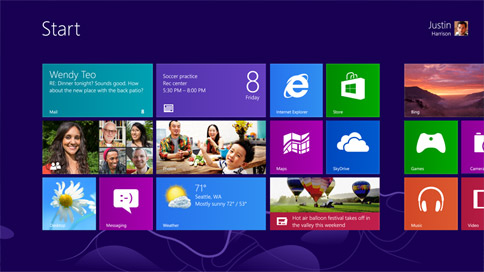The last time they made such a drastic change to Windows was back in 1995, when they introduced the Start menu. This time around, the leading developer of Operating Systems has introduced the Metro interface – love it or hate it, this is the future.
Windows 8 is already out there, and the debates among computer users are raging; not surprisingly, since the latest OS upgrade from Microsoft aims for a clear departure from its predecessors. If you’re looking for a verdict on whether you should consider upgrading, this article will point out the most notable pros and cons.
Windows 8 Pros
A breath of fresh air: the new Metro interface is slick, modern, and it does a great job at not looking like an iOS rip-off. The new tiles look pretty good and actually look and work better than conventional icons to describe the content.
Multi-platform OS: the whole concept behind Windows 8 was the introduction of a cross-platform system that works across your laptop, desktop, tablet, smartphone and similar devices. This is obviously great for compatibility reasons, since it makes it even simpler to connect said devices.
Improved performance: from the improved boot and shutdown to several performance tweaks, there are many reasons why Windows 8 will feel noticeably all around brisker than its predecessor, even on older machines. For this reason alone, it may be worth the upgrade.
Cosmetic tweaks: The system developers at Microsoft clearly put a lot of time, effort and research into further polishing the user interface. As such, there are some small but important details that truly shine; for example, the new file copy dialog is complete with transfer speed graphs and looks more advanced than anything we’ve seen in any other operating system, so far. Likewise for the task manager, that now offers significantly more information and performs better than ever before.
Easy account integration: Windows 8 makes it really easy (and natural) to synchronize your e-mail, social media and cloud storage accounts into your system profile. This is a logical step forward in integrating local apps with online services. However, on the flip side…
Windows 8 Cons
Forced account integration: Unfortunately (although logically), they do try to push you to use their own services such as Skydrive, even where you may already be using popular alternatives to the same service. Likewise, you’ll have to register a Microsoft account if you want to get all integration benefits of the new OS.
Ahead of its time: people don’t really like new things – not when it comes to new things they have to learn how to use for work. Not that it’s really so hard to use; but since it’s different from what you’re accustomed to… it calls for user adaptation. Make no mistake: its being too innovative is of the greatest complaints against Windows 8, although in perspective we believe it’s more of a virtue than a fault.
Jack of all trades, master of none: while struggling to develop an Operating System that works across all kinds of devices, Microsoft came out with a product that doesn’t particularly excel as a platform for desktop computers, which has long been their main market.
Meant to be touched: Windows 8 clearly places an emphasis on touch controls. While it can be used with a regular keyboard and mouse, the user experience just doesn’t feel as polished as it should. Maybe it’s something we’ll get used to, maybe it’s subtleties they still have to fine-tune; only time will tell.
Windows Store has yet to mature: Maybe in a couple of years it will stand up proudly against the likes of Google Play and Apple Store. But for the time being, Windows Store is a nursing baby – sure, it shows promise in terms of usability, but just there aren’t many apps available to draw in the user masses.
What’s the final verdict?
As you can see, there are many things going for – and against – Windows 8. Some of these aspects are bound to improve with time, while others just require the user to adapt. In all case, we believe that you should at least try Windows 8: and while you do, focus on making your own judgments, rather than going for the opinions you’ve read so far (not an easy thing to do, with the flurry of passionate reviews going around).
Even though we don’t think this is a worthwhile upgrade for everyone, we know for a fact many users will be pleased with Windows 8; the question you should ask yourself before making the jump is: “am I ready to try something a little different from what I’m used to?” If so, chances are you’ll love it!

